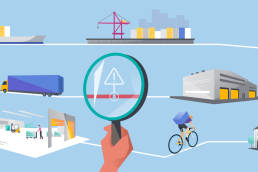With an abundance of ‘free’ mapping technologies woven into our daily lives there is a common misconception that these services come without a cost.
However, while many services are free of charge, use freemium models, or are open source, the true cost comes from the potential privacy breaches involved in selling your data to large service providers.
Here’s what companies need to know.
Poor Privacy Policies
It’s not hard to imagine that companies are hungry for location data – even anonymised data – given the numerous business opportunities it can bring: from geotargeted advertising to logistics coordination.
It’s also no surprise that providers like Google Maps or OpenStreetMap pretty much allow anybody to use their infrastructure to create apps and tools.
The problem is, as soon as data is on an open source platform, it is no longer exclusively held by you or your company. All too often it can be used without your knowledge, for profit by other organisations. This is primarily why governments and NGOs are hesitant to use them.
In fact, many “free” apps make money by reselling your location data to third parties. In fact, your data is routinely bought and sold by dozens, possibly hundreds, of companies. As the volume of information held about you grows, this data paints a far clearer picture of your habits and can reveal a great deal about you or your business.
The Dangers of Data
Data validity is also critical and the potential abuse of this data or the interpretation has dangers which potentially we could all face. For example, on open platforms there is little consistency on the listing of road structures.
This can have potentially dangerous consequences for trucks who rely on bridge height data to be stored on their satellite navigation devices. Not only that, but those who are so inclined can essentially vandalise open source maps too – noting the now infamous ‘Android peeing on Apple logo’ that was embedded in Google Maps a few years ago.
On a much more serious note, the fact these location technologies can be manipulated is worrying – considering the fact they’re used to corroborate criminal evidence… and aren’t always correct.
Consider the case of Jorge Molina of Avondale, Arizona, who was arrested after police discovered his car was the same make and model as one spotted at the scene of a murder. They issued a warrant to Google for his location history in a geofenced area. He was soon found to be innocent – after 6 days spent in jail which cost him his job, car, and reputation.
Protecting Your Company’s Location Data
The seriousness of all of these matters can’t be taken lightly. That’s why it’s essential that companies act. The first step is knowing exactly what data is being stored and where. By accurately identifying their data flow and its vulnerable points, companies can take informed decisions concerning the measures they need to take to protect it.
A dedicated system moderator is also critical in ensuring that any location data you’re using is correct and up to date. This is a combination of human moderation and technology – being able to detect inconsistencies at scale and addressing them individually. Many of the open platforms do not have this facility and so there are real vulnerabilities – for input errors or even sabotage.
Local Eyes Can Help
At Local Eyes we truly understand the value of your data. We want you to be in complete control of how it is used. We are experienced in securing and protecting you data for an array of location technologies. We have the means to implement the systems and services your business needs to get the most of our bespoke location intelligence in a secure network.



